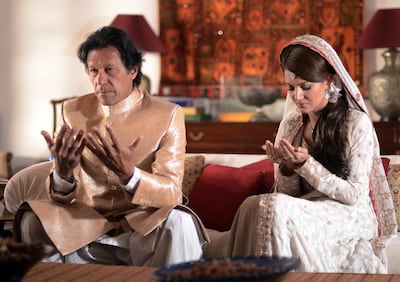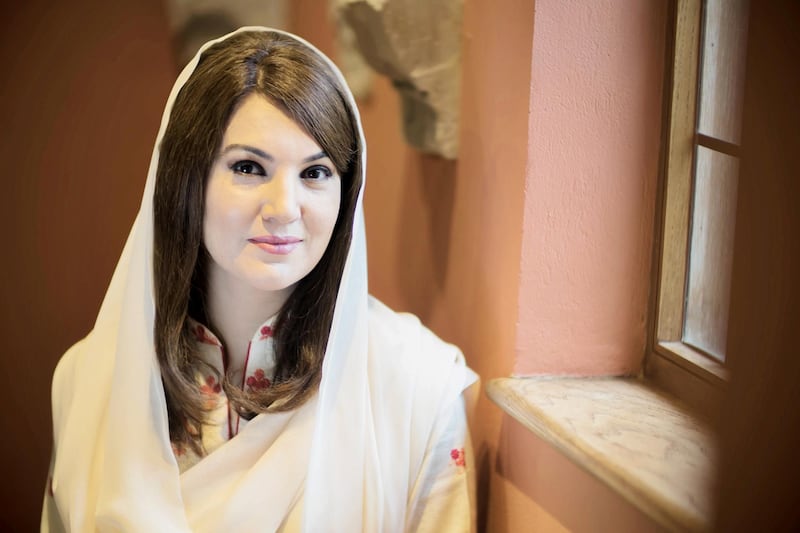Much ink has been spilled in the media, particularly across India and Pakistan, in the run-up to the release of 45-year-old Reham Khan's self-titled memoir (read our interview with her here).
As a broadcast journalist and social activist in the United Kingdom and Pakistan, Khan was already a familiar face in the sociopolitical worlds of the two countries, but in 2015, her celebrity status multiplied the day she married Imran Khan, former captain of the Pakistan cricket team and the country’s new prime minister.
As Imran Khan’s wife, albeit for only 10 months, Reham says she had a ringside view of the enigmatic leader’s widely gossiped-about private and romantic life, as well as insight into the inner workings of Pakistan Tehreek-e-Insaf (PTI) – the political party that Imran Khan is the chairman of – and the political machinery that worked zealously to get him elected to high office.
That knowledge, along with the promise of sensational disclosures, has been the unique selling point for Reham’s memoir from day one, as evidenced by leaked excerpts from the book. And Reham doesn’t disappoint.
Descriptions of Imran's apparently hedonistic lifestyle

Imran and their short-lived marriage understandably dominate the narrative of the book, given that it’s the reason most people will buy it. Ironically, though, the very parts that generated public interest are the bits that paint not just Imran, but the author, too, in an unflattering light.
The endless and minutely detailed criticism of Imran and his apparently hedonistic lifestyle, contrasted against the author's extreme emphasis on her own adherence to Islam are, eyebrow-raising and eventually exhausting. If one is to accept all the book's assertions about Pakistan's "austerity" Prime Minister as truth, it's tough to stomach the notion that Reham could remain so immune, so righteous, and unflinchingly pious in the face of such unbridled indulgence and power.
Reham describes in detail how the two met, her early interactions with the cricketer-turned-politician, and her many problems with the politics of his party. While the details of election coverage and an alleged buying of votes is a fascinating backdrop, the author’s retelling of the couple’s story boils down to the stuff that cheesy romance novellas are made of.
She, the fierce, principled journalist speaking truth to power, and he, the towering, lion-like rising star of Pakistani politics. This characterisation continues as the author describes their courtship and his attempts to woo her, and her three children from her first marriage.
The larger-than-life persona reportedly comes crumbling down soon after the two tie the knot. The author’s rose-tinted glasses come off as she slips into life with Imran and is slowly exposed to his many vices.

Nothing is spared the scrutiny of Reham's journalistic eye, not his "sloppy", unclean habits nor his unsophisticated way of living. "Imran was completely unaware of basic hygiene," she writes. "The bathroom needed heavy disinfecting after use." She writes about his eating habits: "I gently tried to introduce forks for salads, and urged Imran not to spit back in his plate." She mentions his reportedly "bitter" relationship with his two older sisters: "He is not a brother to me. He is a commodity. We have to get where we want with him," Reham quotes his sister Aleema as saying.
She also details his “depressing” nine-year-long marriage with ex-wife Jemima Goldsmith. “I cried on the night of our wedding reception” were Imran’s supposed words to her on their wedding night, while describing how unhappy he was in his first marriage, Reham writes.
And of his politics, she writes: “There were several distinct lobbies within PTI. All wrestling for a measure of power and influence.”
The major issue with the book, as well as its highlight...
Reham's critical examination of Imran's character can be justified – she is, after all speaking of their life together, and her experience and revelations from it – but as someone who claims to be a feminist and a deeply sensitive person, Reham's scurrilous, unforgiving quips about Jemima and other women are unnecessary, at best, and distasteful, at worst. To her credit as an author, and as she said in a recent interview with The National, the book is more than just a tell-all about her famous ex-husband.
Imran becomes a mainstay only in the second half of the book. The first half is devoted to her early life in Libya as the privileged third child of expat parents. She talks about her western upbringing and education, and the challenges of reconciling them with traditional Pakistani values when the family moved back home. She speaks about living in General Zia-ul-Haq’s Pakistan and of being married off to her first cousin at the age of 19, with the promise of her choice of college education in England.
Surprisingly, this is the part that makes the memoir a worthwhile read. You feel the shocked young bride’s horror and anguish when she realises the prince she married is really a stingy, controlling frog. You weep for her as she describes the 13 years of living with her reportedly abusive first husband. And you cheer for her when she finally finds the courage to leave him, for the sake of her three children.
There’s plenty of unsubtle virtue-signalling in the first half of the book too – her faith in God and goodness never goes unmentioned, and she never talks about herself doing anything questionable, or making a poor decision in a moment of weakness – but as a woman, it’s tough to not feel invested in the bleakness of the picture she paints. We’ve all had that one (or more) friend or relative who lived a charmed life on the outside, but was existing in a horrifying reality behind closed doors.
Tell-alls and memoirs, particularly by ex spouses, are meant to be read as one side of a story, no matter how juicy the revelations are. Reham’s work is intriguing, but I read it with more than a pinch of salt.
_____________
Read more:
The austerity prime minister Imran Khan leads by example
Twitter debate rages over Bushra Khan's niqab
Meeting Jamil Dehlavi - Pakistan's most intriguing filmmaker
_____________






